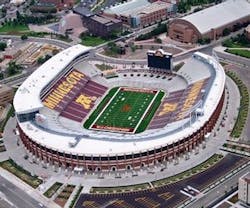TCF Bank Stadium is First Football Stadium to Achieve LEED Certification
TCF Bank Stadium has been certified LEED-NC Silver as part of the U.S. Green Building Council’s rating system. It’s the first football stadium to earn the green designation.
Designed by Populous, the 50,805-seat stadium was developed on a brownfield site atop a former rail yard by Hines for the University of Minnesota. The stadium was named TCF Bank Stadium after a $35 million, 25-year naming sponsorship by TCF Bank, which is headquartered in the Twin Cities.
Based on the university’s strong environmental position and commitment to sustainable principles, Hines worked with Populous and the project team to create a holistic design that blends well with the surrounding environment and other university buildings. Green features and programs include a reflective roof to reduce heat island effect, a 50 percent reduction in the use of potable water for landscape irrigation, a 30 percent reduction in indoor potable water use, a comprehensive waste-diversion program, and the use of low-emitting materials, adhesives, paints, and sealants. In addition, more than 98 percent of construction waste was diverted from the landfill back into the manufacturing cycle.
Some of the most inventive green features for a project of this magnitude deal with stormwater management and filtration. As part of a 75-acre campus stormwater system, the stadium diverts runoff beneath a grass plaza on the south side of the stadium into an innovative water management and filtration system. Using pervious sidewalk paving, vegetative bioswales, sand filters, and a large rate control pond, rainwater enters the Mississippi River as clean as it was when it fell from the sky.
Hines Senior Vice President Bill Chopp says, “The LEED certification of this complex development signals to the real estate community that any type of project of any size can be executed in an environmentally and economically responsible way.”
“TCF Bank Stadium is an historic project for the University of Minnesota, and it was important to us to do it right,” says President Robert Bruininks. “This designation in particular underscores the commitment of the Board of Regents and the leadership of the university to principles of sustainability, energy conservation, and responsible stewardship of our environment and our resources.”
